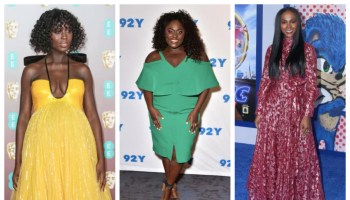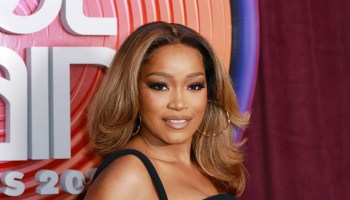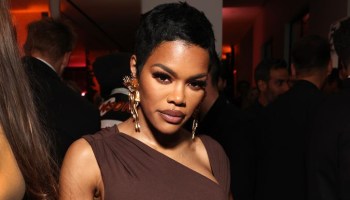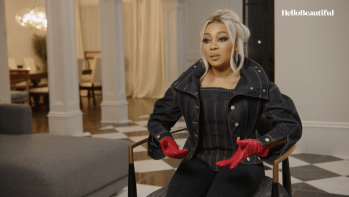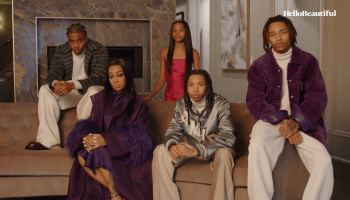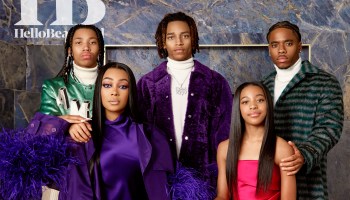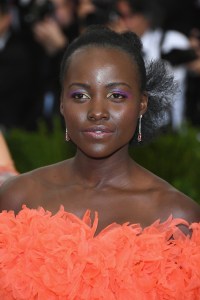
Source: Dia Dipasupil / Getty
While promoting her anticipated children’s book, Sulwe, Oscar winner Lupita Nyong’o dropped some serious nuggets about colorism.
When talking to BBC Newsnight on Monday (October 7) about the concept of her book, which centers on a Black girl who has darker skin than her family, Lupita shared her own personal experiences.
“I definitely grew up feeling uncomfortable with my skin color because I felt like the world around me awarded lighter skin,” the Black Panther and Little Monsters star told host Emily Maitlis.
Adding that said her lighter-skinned younger sister was called “beautiful” and “pretty,’ adding “Self-consciously that translates into: ‘I’m not worthy.'”
Most importantly, she stressed that colorism “is the daughter of racism” in “a world that rewards lighter skin over darker skin.”
Take a look:
While colorism is an extension of racism and white standards of beauty that have been force-fed to us (hence, her being told that she was “too dark” during an audition), Lupita is stating nothing but facts when she says that Black folks have also internalized this hate.
“We still ascribe to these notions of Eurocentric standards of beauty, that then affect how we see ourselves among ourselves,” she said.
She’s absolutely right because the lens we view ourselves through doesn’t always reflect the reality of our infinite beauty. It’s society’s own initial reception of Lupita’s beauty that truly woke me up to how dangerous and irrational colorism is in our community.
Back in 2012, when Lupita first came on the scene playing Patsy in 12 Years A Slave and how instantly inamoured Hollywood became with her—as was I.
Whether it was her slaying the red carpet or being named People’s Most Beautiful Person, people couldn’t get enough of this new It-Girl.
And yet, while this was happening in the “mainstream” world, it felt as is some Black folks had a different take on her fame. On the blogs, Twitter and Facebook, even the “wokest” folks expressed this fake concern about Lupita being overexposed and worry that she was being eroticized and fetishized by white folks. Even worse, there was this widespread belief that white folks were only praising her beauty (and dark skin) to somehow make fun of Black folks.
Quite honestly, it’s pretty damn pathological.
When white people praise light-skinned Black women like Beyonce or Tessa Thompson or the countless other beige-looking starlets, we wouldn’t bat an eye or question their motives because light-skinned and racial ambiguity is the standard of beauty. It’s what has been forced down our throats and we accept it. But when that same shine was focused on Lupita, it invoked something in us.
It was an internalized disbelief that white folks could never find Lupita beautiful because we didn’t (well y’all, ’cause she’s the baddest woman on the planet to me). It was if her mocha skin and short tight 4c afro should never rock the cover of Vogue because we actually believed it wasn’t worthy because that’s what white folks had been telling us…and believed it. Somehow we were flipping this to say and do everything except admit we were the ones having a problem.
Self-hate is a helluva drug.
Granted, it’s been years since that all went down and things are slowly getting better, but colorism and disdain for darker-skinned Black women is still as persistent and pervasive as ever. Just look on Twitter, the ‘Gram or any other pocket of Black culture, there are examples of how our darker-skinned sistas are mistreated, ignored and verbally berated for the melanin. Even our favorite Black Hollywood gatekeepers continue to push this narrative by casting mostly lighter-skinned starlets in roles (especially as love interests), pushing out the chocolate sistas who are equally if not more talented.
So say what you want, but all of this is happening on our watch by our own hands. While colorism may be the daughter of racism, it’s also the sister of internalized racism.
The real question is what are we as Black people going to do to stop it?
BEAUTIES: What are your thoughts on colorism in Black America?
RELATED NEWS:
‘Basketball Wives’ Recap: This OG Situation Seems Like Colorism At Work
Youtube Vlogger Disappointed Her Daughter Didn’t Have ‘Pretty Eyes,’ Responds To ‘Colorism’ Backlash

